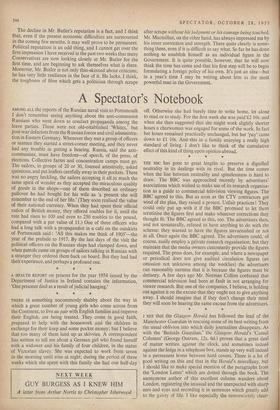A Spectator's Notebook
AMONG ALL the reports of the Russian naval visit to Portsmouth 1 don't remember seeing anything about the anti-communist Russians who went down to conduct propaganda, among the leave parties. These were not old-established 'Whites,' but post-war defectors from the Russian forces and civil administra- tion in Eastern Germany. Whenever they met a group of officers or seamen they started a street-corner meeting, and they never had any trouble in getting a hearing. Russia, said the anti- communists, must have freedom—of speech, of the press, of elections. Collective farms and concentration camps must go. The sailors, in groups of 20 or 30, listened attentively, asked questions, and put leaflets carefully away in their pockets. There was no angry heckling, the sailors accepting it all in much the same spirit of wonder as they accepted the miraculous quality of goods in the shops—one of them described an ordinary pullover he had bought for his wife as 'a present she will remember to the end of her life.' (They soon realised the value of their national currency. When they had spent their official ration of British money, they offered roubles for it, until the rate had risen to 100 and even to 250 roubles to the pound, compared with a par value 'of 11.) One of three officers who had a long talk with a propagandist in a café on the outskirts of Portsmouth said : 'All this makes me think of 1905'—the year of the prelude to 1917. By the last days of the visit the political officers on the Russian ships had clamped down, and when patrols came on groups of sailors talking in Russian with a stranger they ordered them back on board. But they had had their experience, and perhaps it profound one.


































 Previous page
Previous page